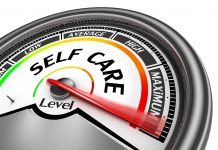Our oral health not only affects our overall health, but also our quality of life and how we connect with others. Our smile has the power to impact our self-perception, confidence and how we feel about ourselves. A recent Delta Dental survey of Americans ages 50 and older, found that 80% of seniors believe that the simple act of smiling can make them feel happier. When we smile, we release endorphins that can help relieve pain, reduce stress and improve our mood which has a direct impact on our overall psychosocial feelings of wellbeing and happiness.
However, many seniors are holding back from smiling due to a self-perpetuating cycle of poor oral health and mental health. More than 1 in 3 seniors shared they smile less than they did when they were younger due to deteriorating oral health or teeth. This can lead to social isolation, as people may be reluctant to smile or talk to others if they are self-conscious about their teeth.
How Our Oral Health and Mental Health Are Connected
The link between oral and mental health is striking for older Americans. Depression can often lead to poor dental hygiene which only worsens feelings of despair. According to the survey results, seniors who are feeling depressed or anxious are more likely to worry about being negatively judged based on the appearance of their teeth and feel shame about their oral health, which can lead to a delay in dental care.
The survey results revealed an inextricable link between our mental health and oral health:
-
Poor dental health leaves people feeling insecure.
Of the seniors surveyed who had a higher incidence of anxiety or depression, more than half feel shame about their oral health and appearance of their teeth. While 60% worry about being negatively judged based on the appearance of their teeth.
-
Dental pain intensifies mental anguish.
Pain in your mouth can also affect your mental outlook. The survey showed seniors are more likely to notice changes in their mood and mental health when experiencing dental pain or discomfort. While 37% of those who frequently or sometimes experience feelings associated with depression or hopelessness reported that oral tooth pain intensifies these feelings.
-
Feelings of anxiety or depression can lead to a delay in care.
Of those surveyed who indicated a higher incidence of feelings of anxiety or depression, over one-fourth shared the last time they went to their dentist for a routine check-up or cleaning was more than three years ago.
-
Negative emotions associated with dental visits create a cycle of oral care neglect.
This can have additional mental health and well-being impacts over time. Better preventive care can reduce cost and mitigate the risk of more invasive treatments in the future.
A disease that starts in our teeth or gums can have profound effects on our mental health and quality of life. Despite this, we continue to separate our oral health from our mental health, including the direct influence it has on our self-esteem, emotional wellbeing, and confidence. All of these can lead to a decline in overall wellbeing and have a severe impact on our daily lives.
If you find yourself smiling less because of mouth pain, see a dentist who can help you take care of your oral health. Contrary to common belief, tooth loss isn’t a result of the aging process. It’s primarily the result of preventable oral disease.
The good news is that there are things we can do to improve our oral health:
- Follow the rule of “2-1-2.” Brush your teeth two times a day for two minutes, floss at least once daily and visit the dentist for check-ups two times a year.
- Buy time after eating. The less time any food is on your teeth, the better. After eating, rinse your mouth with water if you can’t brush right away. This prevents acid and bacteria from setting up shop in your teeth and giving you cavities.
- Stay hydrated by drinking plenty of fluorinated water and eat a well-balanced diet.
- Talk to your dentist and primary care physician about the connection between your oral health and the health of your body.
Talk to Your Dental Professional About Your Mental and Physical Health
Many people have close relationships with their dentist. The space in which the dentist works is personal, and the interaction often creates a close connection. Likewise, dental hygienists spend a lot of time with patients cleaning their teeth. They can notice if your mood is unusual or if you aren’t feeling well. If they ask you, “What’s going on? Is everything OK?” you should feel free to have an open conversation about how you’re feeling or if you have experienced something that has led to a delay in care. For improving your mental health, seek care from your physician or a licensed therapist.
How you’re feeling mentally impacts your willingness and ability to clean your mouth effectively. Being honest with the healthcare professionals in your life is an important step if you’re experiencing feelings of depression or anxiety. Your dentist or dental hygienist can be a resource in guiding you to getting the help you need.
To learn more about the connection between oral health and mental health, view Delta Dental’s Senior Oral Health and Mental Health Report.
























